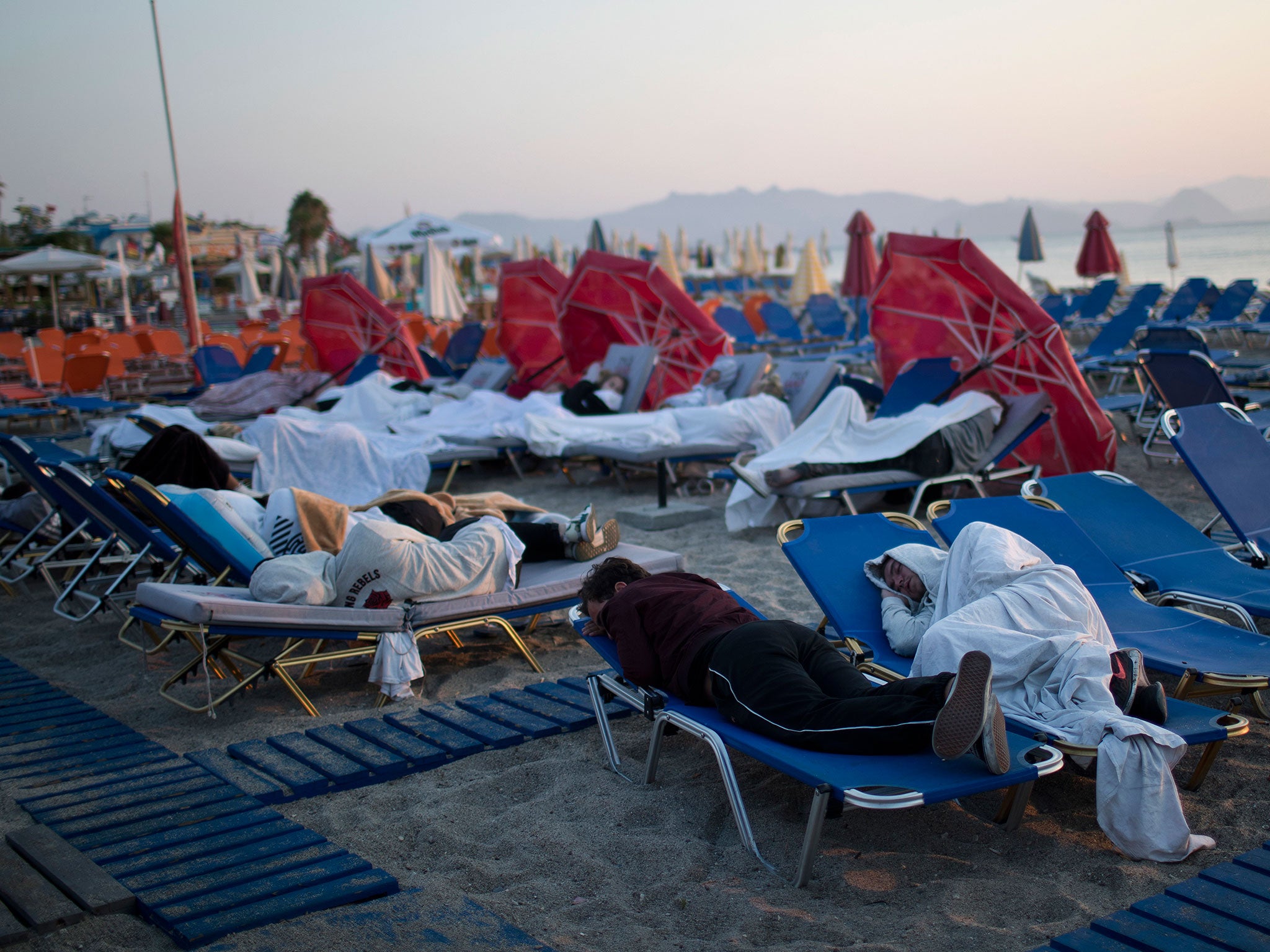Aegean earthquake: Two aftershocks spark panic on Greek island of Kos after two killed and 500 injured
Frightened tourists said they believed another earthquake was happening, such was the strength of the tremor

Your support helps us to tell the story
From reproductive rights to climate change to Big Tech, The Independent is on the ground when the story is developing. Whether it's investigating the financials of Elon Musk's pro-Trump PAC or producing our latest documentary, 'The A Word', which shines a light on the American women fighting for reproductive rights, we know how important it is to parse out the facts from the messaging.
At such a critical moment in US history, we need reporters on the ground. Your donation allows us to keep sending journalists to speak to both sides of the story.
The Independent is trusted by Americans across the entire political spectrum. And unlike many other quality news outlets, we choose not to lock Americans out of our reporting and analysis with paywalls. We believe quality journalism should be available to everyone, paid for by those who can afford it.
Your support makes all the difference.Two strong aftershocks have struck the Greek island of Kos within minutes of each other, sending startled residents and tourists scurrying away from homes and restaurants.
A tremor measuring a preliminary 4.4 magnitude struck at 8.09pm local time (6.09on BST), sending restaurant customers scurrying toward the middle of the town's main square, as far away as possible from buildings.
Sixteen minutes later, a second 4.6-magnitude tremor struck, the Athens Geodynamics Institute reported. The first tremor had its epicentre only 13 miles northeast of Kos at a depth of 6 miles.
Hundreds of residents and tourists spent Friday night sleeping outdoors on the island, too afraid to return to their homes or hotels after the quake that struck early on Friday, killing two men on Kos and injuring almost 500 others in Greece and Turkey.
Many camped out in parks and olive groves, or slept in their cars or on beach and swimming pool lounge chairs.
The aftershocks meant that many would spend a second night outdoors.
During the day in Kos, churches, an old mosque, the port's 14th-century castle and other old buildings that suffered in the quake were being checked by archaeologists and experts from Greece's Culture Ministry.
The US Geological Survey measured Friday's earthquake at magnitude 6.7, with Greek and Turkish estimates a fraction lower. Two men, a Turk and a Swede, were killed when a wall collapsed into a popular bar in the Old Town of Kos.
The most seriously injured in Greece were airlifted to hospitals on the mainland and the southern island of Crete, and at least two were still in critical condition on Saturday.
The Turkish man's parents were on the island making arrangements to repatriate his body home by boat, possibly on Sunday.
Panagiotis Bekali, a 30-year-old resident, spent the night sleeping in an olive grove with relatives while his five-year-old son and 16-year-old nephew slept in the family car.
“There were cracks in the house (from the earthquake) so we went straight out,” he said. “We were afraid to stay indoors, so the whole family slept outside.”
Dozens of aftershocks have shaken the island. John Grant, a 60-year-old tourist from Britain, said he felt safer sleeping outside.
“Coming from somewhere that doesn't have earthquakes, you don't understand,” he said from his makeshift bed on a lounge chair. “So to me it was very frightening being in the building. But being outside, I know I'm safe.”
About 350 of the injuries occurred in Turkey, in Bodrum and other beach resorts, as people fled buildings and as a sea swell flung cars off the road and pushed boats ashore. Seismologists said the shallow depth of the undersea quake Friday was to blame for the damage.
In Kos, the quake damaged the island's main port, so ferries were being diverted to the smaller port of Kefalos on the island's southwestern coast.
Serif Damadoglou Soukri, the imam of Kos, said the greatest damage to Kos mosques was sustained by the central 17th-century Defternatar Ibrahim Pasa mosque, whose minaret, restored a few years ago, collapsed completely. Ancient columns also toppled over in the southern part of the 2nd-century agora in the main town.
Greek Orthodox Priest Vassilis Hlampanis said one of the damaged churches was repairable.
“The greatest damage was sustained mainly in part of the sanctuary, in the middle part which fell, but there are also other sections around the external brickwork and certainly also internally,” he said.
Kos Mayor Giorgos Kyritsis said island's biggest infrastructure problem was the damage to the main port. Coast guard divers were on the scene inspecting the jetty.
“Life on the island is returning to normal,” Kyritsis said. “The infrastructure problems are being repaired.”
The mayor said Kos hadn't seen many tourist cancellations as a result of the quake.
“(Visitors) are touring the island with their tour guides. We don't have a big problem. The ferry connection has been restored with the port of Kefalos and we are waiting as soon as possible to repair the damage at the port,” he said.
Gift shop owner Giannis Manoutkos said life on the island had returned to its easy-going ways.
“Everything is normal now. The situation was bad for two days ... we are coming to a normal life again,” he said.
Associated Press
Join our commenting forum
Join thought-provoking conversations, follow other Independent readers and see their replies
Comments